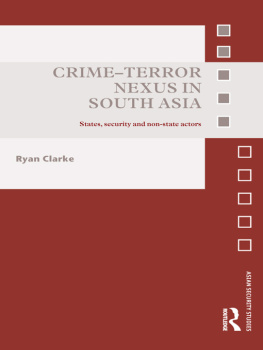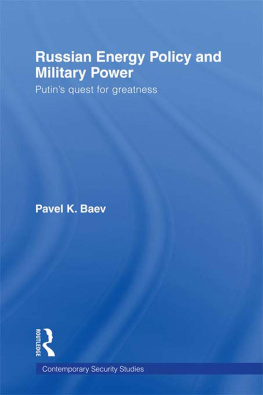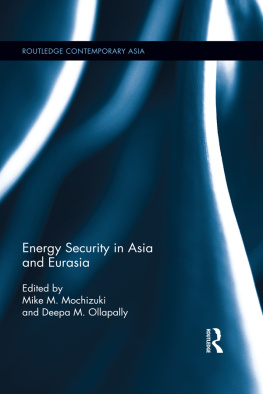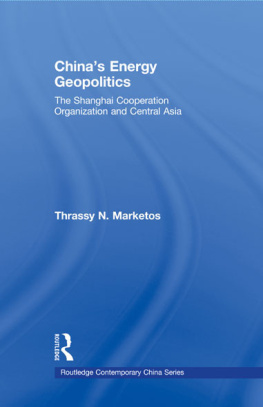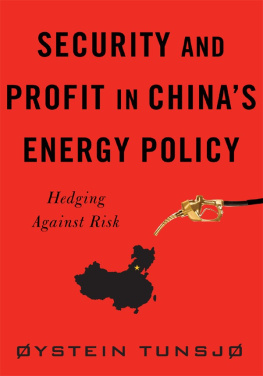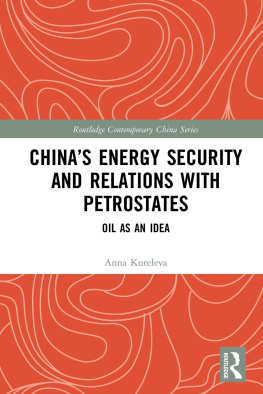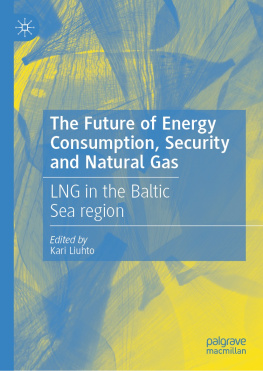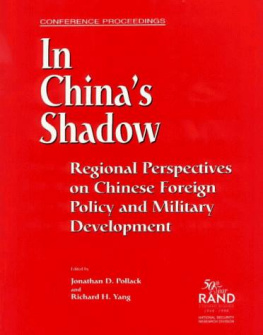The letort papers
Chinese Energy Security:
The Myth of the PLANs Frontline Status
Ryan Clarke
August 2010
The views expressed in this report are those of the author and do not necessarily reflect the official policy or position of the Department of the Army, the Department of Defense, or the U.S. Government. Authors of Strategic Studies Institute (SSI) publications enjoy full academic freedom, provided they do not disclose classified information, jeopardize operations security, or misrepresent official U.S. policy. Such academic freedom empowers them to offer new and sometimes controversial perspectives in the interest of furthering debate on key issues. This report is cleared for public release; distribution is unlimited.
*****
This publication is subject to Title 17, United States Code, Sections 101 and 105. It is in the public domain and may not be copyrighted.
*****
Comments pertaining to this report are invited and should be forwarded to: Director, Strategic Studies Institute, U.S. Army War College, 122 Forbes Ave, Carlisle, PA 17013-5244.
*****
All Strategic Studies Institute (SSI) publications may be downloaded free of charge from the SSI website. Hard copies of this report may also be obtained free of charge by placing an order on the SSI website. The SSI website address is: www.StrategicStudiesInstitute.army.mil .
*****
The Strategic Studies Institute publishes a monthly e-mail newsletter to update the national security community on the research of our analysts, recent and forthcoming publications, and upcoming conferences sponsored by the Institute. Each newsletter also provides a strategic commentary by one of our research analysts. If you are interested in receiving this newsletter, please subscribe on the SSI website at www.StrategicStudiesInstitute.army.mil / newsletter/.
ISBN 1-58487-456-2
FOREWORD
The continued impressive growth and development of China, while always of critical strategic importance, has surged in recent years to the forefront of the consciousness of American policymakers, scholars, and the news media, as well as the general public. This trend has been accelerated by the staying power that China demonstrated following its relatively graceful weathering of the global financial crisis, in the process defying a wide range of doomsday prophecies of massive organized riots by newly unemployed rural factory workers and various other classes of people angry with Beijing over economic slowdown or stagnation. The future directions of China cannot likely be predicted with any reliable degree of accuracy (though this does not prevent many from trying); thus, the best methodological approach is to obtain the most rigorous understanding possible regarding the dynamics of Chinas current security challenges. While many Chinese strategists now take a holistic and more internationalized view of Chinas security environment, with Western analysts speaking frequently of Chinese global power projection, its domestic energy security and regional territorial disputes are two of the most pressing security issues with which Beijing must grapple. The latter requires a strong Peoples Liberation Army Navy (PLAN) while the former, contrary to most analyses, actually has a minimal role to play given the nature of the market.
A key aim of this work is to demonstrate that the greatest threat to Chinese energy security is domestic market inefficiencies and perverse incentive structures, thus clearly highlighting the myth of the PLANs frontline status. As the Sino-U.S. relationship continues to assume greater strategic importance, energy security is a component that Washington and Beijing can simply not afford to get wrong. As opposed to dedicating substantial resources to planning for conflict scenarios that are based upon fundamentally flawed conceptions, namely, naval blockades designed to starve China of energy resources or strategies to preempt or circumvent one of these blockades, both parties would be much better served by focusing on sound economics and distribution/refining practices. Cooperation in this sphere is not only a much more immediate and realistic option; it also deals with the root of the dilemma, something which is clearly in the interests of the United States as well as China.

DOUGLAS C. LOVELACE, JR.
Director
Strategic Studies Institute
ABOUT THE AUTHOR
RYAN CLARKE is a Visiting Research Fellow at the East Asian Institute (EAI), National University of Singapore. Prior to EAI, he worked with the S. Rajaratnam School of International Studies (Singapore), the Royal United Services Institute (London), and the Institute for Defense Studies and Analyses (New Delhi). He has spent the majority of the past 4 years living, researching, and conducting advisory work in Asia. Prior to Cambridge, he worked with several specialized police units, including the U.S. Marshals in Las Vegas, Nevada. Dr. Clarke has published nearly 30 articles and has several more forthcoming. He is fluent in both Hindi and Urdu. Aside from these languages, he speaks basic Punjabi as well as Bahasa Indonesia and Mandarin at an intermediate level. Dr. Clarke holds a bachelors degree in criminal justice studies from the University of Dayton, graduating magna cum laude; a masters degree in international relations from Bond University, Australia; and a Ph.D. in politics and international studies from the University of Cambridge, United Kingdom.
SUMMARY
This monograph examines the dynamics of Chinas energy security dilemma and the role of the Peoples Liberation Army Navy (PLAN). Following this, PLAN development is discussed, and its future role in regional security is hypothesized. This report argues that it is domestic market inefficiencies and poor management practices that pose the greatest threat to Chinas energy security. Further, less and less of Chinese energy imports are making their way to the country by sea; thus the PLAN actually has a minimal role to play. Given these realities, Chinese fears of a naval blockade that deprives it of energy supplies as well as American confidence that this is a realistic strategic option in the event of hostilities are implausible. In addition, Beijings desire to develop aircraft carriers and other high-tech naval capabilities combined with its contribution to the anti-piracy mission in the Gulf of Aden have led many analysts to erroneously conclude that China seeks to engage in global power projection like the United States. However, the focus of the PLAN will remain regional and on asymmetric capabilities, namely, the effective use of submarines and other undersea devices that ultimately seek to deter American and possible Japanese involvement in a conflict over Taiwan and/or in the South China Sea, such as the Spratly Islands, which China views as inalienable parts of its territory. Although Chinas interests are expanding and becoming more international in nature, recovering from the century of humiliation and ensuring domestic legitimacy remain the top priorities of Chinas leadership.
Chinese Energy Security:
The Myth of the PLANs Frontline Status
The Dynamics of Chinas Energy Security
Dilemma.
To play a great power role, the Peoples Republic of China (PRC) needs to develop capabilities which would allow it to secure its global economic interests and trade routes and provide muscle behind its diplomacy. It also needs military capabilities which are able to deter or defend China against other great powers, first and foremost the United States. The Chinese are keen to safeguard their economic interests, not a surprising fact given that economic performance is often linked to the legitimacy of a government or ruling party. However, Chinas economic interests have begun to expand far beyond its own territory in recent years, and the PRC is now the worlds third largest trading power and third largest economy, with the latter achievement heavily reliant on trade and, by extension, its sea lines of communication. China has tasked the Peoples Liberation Army (PLA) with protecting the PRCs maritime rights and interests though it is not currently up to the job. Nonetheless, in a December 2006 meeting of senior Party members of the Peoples Liberation Army Navy (PLAN), President Hu stressed that China is a maritime power and that the PRC should endeavor to build a powerful peoples navy that can adapt to its historical mission during the new century. He went further to say that the PLAN has the important and glorious responsibility to protect Chinas authority and security, and maintain our maritime rights.


